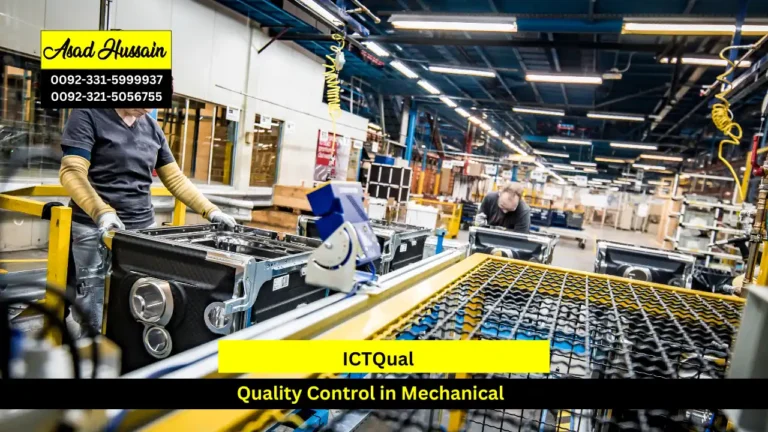The ProQual Level 6 Diploma in Quality Control and Quality Assurance (QA/QC) – Engineering is a prestigious qualification designed for professionals in the engineering sector who seek to enhance their expertise in ensuring the quality and reliability of engineering products and services. This diploma focuses on developing advanced skills and knowledge in quality management systems, techniques, and tools used across various engineering industries. It equips candidates with the ability to implement quality control measures, assess product conformity, and manage quality assurance processes effectively.
The primary goal of this qualification is to empower professionals with the ability to monitor and improve product quality throughout its lifecycle, from design and development to manufacturing and testing. Key topics covered in the curriculum include quality management principles, auditing, risk management, statistical process control, and the application of international quality standards. These skills are essential for individuals looking to progress into senior management positions, where the responsibility for maintaining high standards of quality control and assurance lies.
One of the core components of the ProQual Level 6 Diploma is its focus on the application of quality assurance systems in real-world scenarios. Candidates will gain hands-on experience in developing and implementing quality plans, conducting internal audits, and ensuring compliance with industry regulations. Through this practical exposure, individuals are prepared to handle complex quality issues and contribute to continuous improvement initiatives within their organizations. The qualification also emphasizes leadership, enabling professionals to guide teams and departments in quality-driven cultures.
Additionally, this qualification supports career progression by opening doors to a wide range of job opportunities in quality control and assurance roles within engineering firms, manufacturing companies, and service providers. Graduates can pursue positions such as Quality Control Manager, QA/QC Engineer, Quality Assurance Specialist, or even senior roles in quality management. These positions are in high demand, as organizations seek skilled professionals to help them meet strict regulatory requirements and maintain competitiveness in an increasingly quality-conscious market.
Ultimately, the ProQual Level 6 Diploma in QA/QC Engineering is a valuable investment for anyone in the engineering field aiming to take their career to the next level. By acquiring in-depth knowledge of quality assurance and control practices, candidates can make a significant impact on their organizations’ ability to deliver high-quality products and services. Whether you are looking to enhance your existing skills or take on a leadership role, this qualification provides the tools and expertise needed to excel in the ever-evolving world of engineering quality assurance.
Program Highlights
Study Units
- Principles of Quality Control and Quality Assurance
- Quality Management Systems and Standards
- Quality Control & Quality Assurance in Civil Engineering Projects
- Quality Control & Quality Assurance in Mechanical Field Activities and Systems
- Quality Control & Quality Assurance in Electrical Systems
The ProQual Level 6 Diploma in Quality Control and Quality Assurance (QA/QC) – Engineering typically requires the following entry criteria:
- Relevant Industry Experience: Candidates should have practical experience in engineering or a related field. This experience ensures that the individual is familiar with engineering processes and quality control standards.
- Level 5 Qualification or Equivalent: A Level 5 qualification in a relevant discipline, such as engineering, quality assurance, or manufacturing, is usually required. Alternatively, candidates with equivalent work experience in quality control and engineering may also be considered.
- Educational Background: Ideally, candidates should have a background in engineering, manufacturing, or a similar technical field, with an understanding of basic engineering principles, systems, and terminology.
- Basic Literacy and Numeracy Skills: Strong literacy and numeracy skills are essential to interpret technical documents, reports, and quality standards. Some qualifications in English and Mathematics may be required.
- Commitment to Professional Development: Candidates should demonstrate an interest in advancing their knowledge and skills in quality control and assurance within the engineering sector.
These entry requirements are designed to ensure that candidates have the necessary knowledge and experience to succeed in the Level 6 qualification. However, specific requirements may vary depending on the awarding body or institution offering the diploma. It’s advisable to check with the provider for precise entry criteria.
Upon completing the ProQual Level 6 Diploma in Quality Control and Quality Assurance (QA/QC) – Engineering, students will be able to:
Principles of Quality Control and Quality Assurance
- Understand the fundamental concepts of quality control (QC) and quality assurance (QA) in engineering disciplines.
- Develop the ability to differentiate between QC and QA processes and their applications in various engineering projects.
- Gain insights into the role of QA/QC in enhancing efficiency, compliance, and reliability across engineering operations.
Quality Management Systems and Standards
- Acquire knowledge of industry-standard quality management systems (QMS), including ISO 9001 and other international benchmarks.
- Learn to design, implement, and maintain QMS tailored to organisational needs.
- Understand auditing processes and the role of continuous improvement in quality management.
Quality Control and Quality Assurance in Civil Engineering Projects
- Apply QA/QC principles to civil engineering projects, ensuring compliance with design specifications and regulatory standards.
- Gain expertise in materials testing, construction inspection, and performance assessment techniques.
- Learn to manage quality issues in large-scale infrastructure projects effectively.
Quality Control and Quality Assurance in Mechanical Field Activities and Systems
- Develop skills in monitoring and evaluating mechanical systems to ensure their functionality and safety.
- Understand inspection techniques for mechanical components, including welding, machining, and assembly processes.
- Address and resolve quality challenges in mechanical engineering projects using structured methodologies.
Quality Control and Quality Assurance in Electrical Systems
- Learn to implement QA/QC measures in electrical engineering activities, focusing on system reliability and safety.
- Gain proficiency in testing and inspecting electrical components, systems, and installations.
- Understand regulatory requirements and standards for quality assurance in electrical engineering.
The ProQual Level 6 Diploma in Quality Control and Quality Assurance (QA/QC) – Engineering is designed for individuals who are seeking to advance their careers in the field of quality control and assurance within the engineering sector. This course is ideal for:
- Engineering Professionals: Individuals already working in engineering roles, such as engineers, technicians, and managers, who want to deepen their understanding of quality control and assurance principles and practices.
- Quality Assurance and Control Specialists: Those working in quality control or quality assurance roles within engineering firms or manufacturing industries who aim to formalize their expertise and enhance their skills.
- Project Managers and Supervisors: Professionals involved in overseeing engineering projects who need to ensure that quality standards are met throughout the project lifecycle, from design to completion.
- Manufacturing and Production Managers: Those working in the manufacturing or production sectors who are responsible for maintaining product quality, ensuring compliance with quality standards, and overseeing quality assurance processes.
- Aspiring Quality Engineers: Individuals aiming to transition into a career in quality engineering or those looking to specialize in quality management systems, audits, and process improvements within engineering fields.
- Individuals Pursuing Certification: Professionals who wish to obtain formal recognition and a qualification that demonstrates their expertise in quality control and quality assurance practices, especially for career advancement or accreditation purposes.
This course is ideal for anyone seeking to specialize in the critical field of QA/QC in engineering, focusing on improving product quality, process efficiency, and regulatory compliance across engineering industries.







